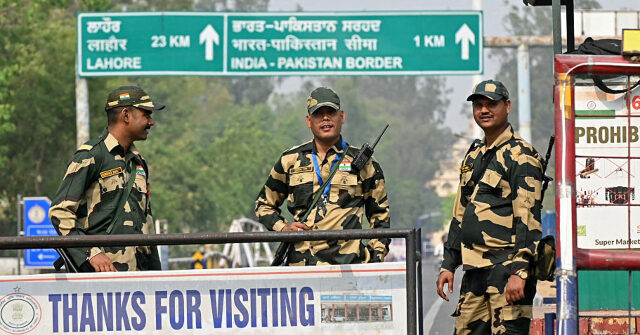Indian Foreign Minister Subrahmanyam Jaishankar told Secretary of State Marco Rubio on Wednesday that the “perpetrators, backers, and planners” of last week’s brutal terrorist attack in Kashmir “must be brought to justice.”
Rubio reached out to both Indian and Pakistani officials on Wednesday to defuse escalating tensions between the two nuclear-armed nations after terrorist gunmen slaughtered 26 people and wounded dozens of others in Pahalgam, a tourist resort area in the contested region of Kashmir.
Indian officials say the attack was masterminded by Lashkar-e-Taiba (LT), an Islamist terrorist organization based in Pakistan. India swiftly identified three suspects in the killings who were members of LT, and two of them were Pakistanis. Many Indians believe the Pakistani government either turned a blind eye to LT’s activities, or actively facilitated the Kashmir attack.
Pakistan said on Wednesday it has “credible intelligence” that India is planning imminent military action against it, using the “false pretext” of the Pahalgam attack. Pakistani officials warned that “any act of aggression will be met with a decisive response.”
The State Department said Rubio told Pakistani Prime Minister Shehbaz Sharif that he needs to “condemn the terror attack” and fully cooperate with an investigation.
Sharif responded by protesting India’s “escalatory and provocative behavior.” He said his government “categorically rejected Indian attempts to link Pakistan to the incident” in Pahalgam.
Sharif asked Rubio to “impress upon India to dial down the rhetoric and act responsibly,” while Rubio told Sharif that Pakistan and India should “continue working together for peace and stability in South Asia.”
The State Department said Rubio “expressed his sorrow for the lives lost in the horrific terrorist attack in Pahalgam, and reaffirmed the United States’ commitment to cooperation with India against terrorism” in his call with Jaishankar.
India closed its airspace to Pakistani air traffic on Wednesday, responding to Pakistan’s ban on Indian airliners last week. India said the ban would remain in effect until at least May 23.
Kashmir is claimed in full by both India and Pakistan, but each country controls only a portion of the territory at present. Officials in the Pakistan-administered segment of Kashmir suspended over a thousand Islamic religious schools on Thursday for at least ten days, “due to tensions at the border and the potential for conflict.”
Civilians who live near the Line of Control (LoC), the border between Indian and Pakistani territory in Kashmir, are reportedly preparing underground bunkers and teaching safety drills to their children.
“For one week we have been living in constant fear, particularly concerning the safety of our children. We make sure they don’t roam around after finishing their school and come straight home,” a shopkeeper in Pakistani Kashmir told Agence France-Presse (AFP) on Wednesday.
The BBC noted on Thursday that Indian Prime Minister Narendra Modi’s government has not formally named any organization as the perpetrator of the attack. Modi has vowed to “identify, track, and punish” those perpetrators “beyond their imagination.”
India has a history of conducting surgical strikes and air raids across the LoC against militants based in Pakistani Kashmir. If Modi exercises that option, the ball would be in Pakistan’s court to either escalate the situation by responding, or de-escalate by writing off a few militant camps as fair game for India’s wrath.
In 2019, for example, after a suicide bomber killed 40 Indian paramilitary troops in Kashmir, India launched airstrikes against several “terrorist” hideouts in Pakistani territory. Pakistan limited its response to a few brief aerial scuffles with Indian planes and claimed India’s bombing runs destroyed nothing but patches of empty forest.
The most alarming possibility for immediate escalation is that India might decide to take control of more territory in Kashmir with ground forces, to create a security buffer against terrorist attacks. Many Indian politicians, including members of the opposition, have urged Modi to respond to the Pahalgam atrocity by seizing some or all of Pakistani Kashmir. Pakistan has enough military assets in the region to turn such an invasion into a major conflict.
Read the full article here


